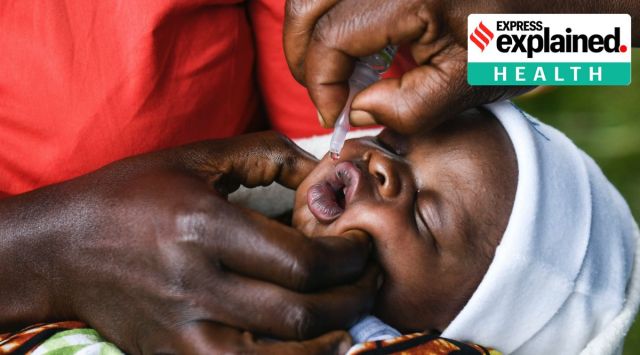Latest Comment
Post Comment
Read Comments
 A baby receives a polio vaccine in Lilongwe, Malawi, on March 20, 2022. In neighbouring Mozambique Health authorities have declared an outbreak of wild poliovirus. (AP Photo/Thoko Chikondi, File)
A baby receives a polio vaccine in Lilongwe, Malawi, on March 20, 2022. In neighbouring Mozambique Health authorities have declared an outbreak of wild poliovirus. (AP Photo/Thoko Chikondi, File)Mozambique identified its first case of wild poliovirus Type 1 this week after a child contracted the disease. It is the country’s first such case since 1992 and the second imported case of wild poliovirus in Southern Africa this year. An outbreak was reported in Malawi earlier this year.
Dr Matshidiso Moeti, World Health Organization Regional Director for Africa, said, “The detection of another case of wild polio virus in Africa is greatly concerning, even if it’s unsurprising, given the recent outbreak in Malawi. However, it shows how dangerous this virus is and how quickly it can spread,”
As of today, wild poliovirus is endemic only in Afghanistan and Pakistan.
What is polio?
According to the US Centers for Disease Control and Prevention (CDC), “Polio is a crippling and potentially deadly disease that affects the nervous system… Because the virus lives in the faeces (poop) of an infected person, people infected with the disease can spread it to others when they do not wash their hands well after defecating (pooping). People can also be infected if they drink water or eat food contaminated with infected feces.”
Even so, most people with polio do not feel sick, while some people have only minor symptoms, such as fever, tiredness, nausea, headache, nasal congestion, sore throat, cough, stiffness in the neck and back, and pain in the arms and legs. In rare cases, polio infection causes permanent loss of muscle function (paralysis). Polio may be fatal if the muscles used for breathing are paralysed or if there is an infection of the brain.
The virus multiplies in the intestine, from where it can invade the nervous system and can cause paralysis. Once that happens, the patient is crippled for life because there is no treatment for the affliction. That is why polio is so dreaded. Polio infection, however, is easily preventable by a vaccine.
Buy Now | Our best subscription plan now has a special price
There are three variants of the poliovirus, numbered 1 to 3. For a country to be declared polio-free, the wild transmission of all three kinds has to be stopped. For eradication, cases of both wild and vaccine-derived polio infection have to be reduced to zero.
Polio cases in India
India was declared polio-free in January 2014, after three years of zero cases, an achievement that is widely believed to have been spurred by the successful Pulse Polio campaign. The last case due to wild poliovirus in the country was detected on January 13, 2011. The WHO on February 24, 2012, removed India from the list of countries with active endemic wild poliovirus transmission.
India launched the Pulse Polio immunisation programme in 1995, after a resolution for a global initiative of polio eradication was adopted by the World Health Assembly (WHA) in 1988.
Under the Pulse Polio programme, all states and Union Territories have developed Rapid Response Teams (RRT) to respond to any polio outbreak in the country. Emergency Preparedness and Response Plans (EPRP) have also been developed by states, indicating steps to be undertaken in case of detection of a polio case.
To prevent the virus from coming to India, the government has since March 2014 made the Oral Polio Vaccination (OPV) mandatory for those travelling between India and polio-affected countries, such as Afghanistan, Nigeria, Pakistan, Ethiopia, Kenya, Somalia, Syria and Cameroon.



